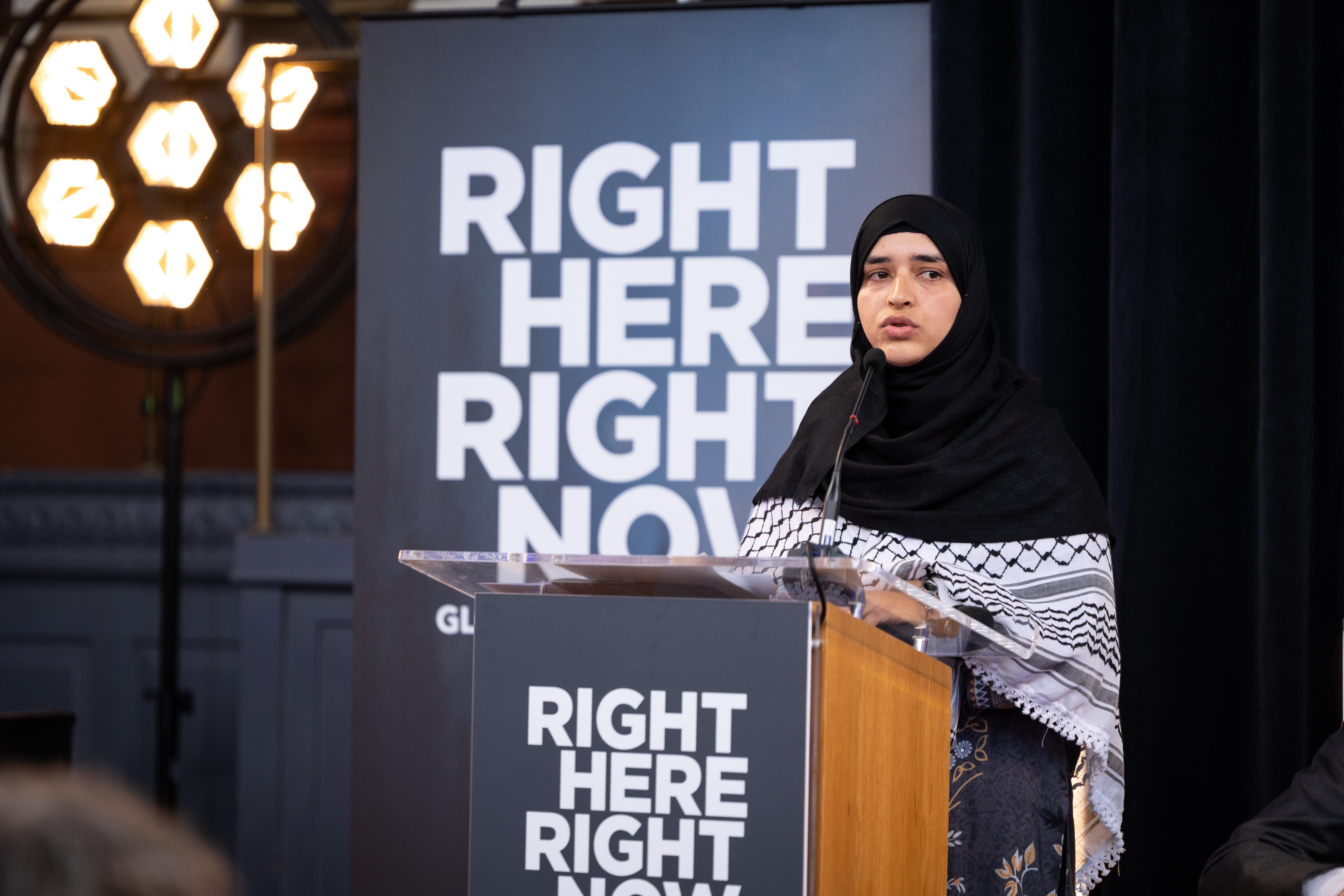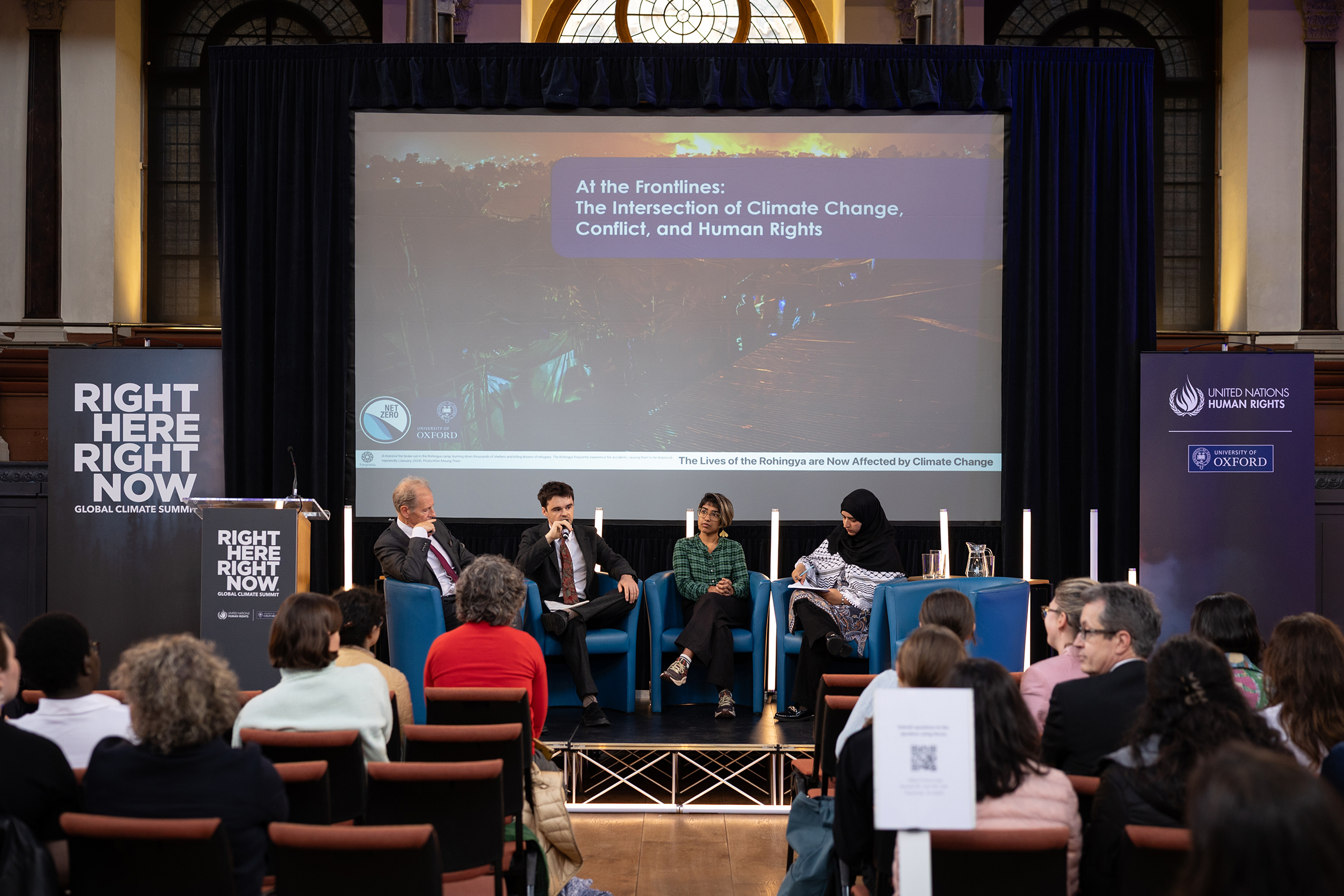SoGE MSc student Tabina Manzoor gives opening address at Right Here, Right Now Climate Summit

Tabina Manzoor, a Kashmiri student, researcher, and environmentalist currently pursuing an MSc in Water Science, Policy, and Management at SoGE, served as a student co-moderator at Oxford’s recently concluded Right Here Right Now Global Climate Summit, where she also gave an opening address at the Sheldonian Theatre.
The global summit, which was held in partnership with the Right Here, Right Now Global Climate Alliance, UN Human Rights, the International Universities Climate Alliance and co-host universities across the world, was the largest climate justice gathering of its kind so far.
Alice Evatt, a research Fellow at the ECI and Oxford Net Zero who also served as Oxford’s Academic Lead for the Summit, said: “Tabina’s contributions were truly outstanding – especially her powerful opening address. She brought insight, poise, and an extraordinary level of preparation to the role, and we were proud to have her as part of the Oxford delegation which was livestreamed around the Globe… It also brought much-needed attention to Kashmir’s place in global climate discussions.”

Tabina spoke at a session titled At the Frontlines: The Intersection of Climate Change, Conflict and Human Rights. An excerpt from her speech reads:
I come from Kashmir, a place often defined by its volatility and geopolitics, caught between three nuclear-armed nations and frequently in the headlines for its conflict. But as someone working on water resource management in Kashmir, I am struck – and, frankly, appalled – by how rarely we speak about its vulnerability to climate change. A humanitarian crisis is unfolding quietly, overshadowed by the noise of political strife.
Climate change is not an abstract future threat; it is a lived reality. It knows no borders, respects no treaties, and recognises no economies. It demands a radical rethinking of how we talk about justice, survival, and peace.
While we often discuss the divide between the Global North and South, we must confront the truth that some communities are not just vulnerable – they are on the frontlines. To speak of climate without speaking of conflict, of human rights, of survival, is to speak in half-truths.
From Ukraine to Palestine, Syria to Sudan, we see populations devastated by human-made crises, while the slow violence of climate change compounds their suffering. And back home in Kashmir, people are barely surviving under the weight of political uncertainty. How can we expect them to speak of climate action when the right to simply live is under threat?
Add to that the Himalayan region, which is among the most climate-vulnerable ecosystems on the planet. Melting glaciers, erratic precipitation, and extreme weather events not only threaten millions of lives downstream, but also risk igniting new conflicts over water, land, and survival. This is no longer a distant concern – it is here, and it is now.

Growing up in the countryside of the Himalayas in Kashmir has helped Tabina develop a deep love for nature and water, which has guided her academic interests in environmental science and water governance. Tabina already holds an MSc in Environmental Science from the University of Kashmir, Srinagar, and a Bachelor's degree in Life Sciences from Women’s Degree College, Anantnag, University of Kashmir. She also holds a Postgraduate Diploma in Environmental Law and Policy, offered online by WWF-India in collaboration with the National Law University, Delhi.
Tabina’s research is also motivated by a desire to highlight the resilience of rural women in her region. She developed and currently leads on a qualitative research project titled “Resilient Women of Kashmir: Navigating Domestic Duties and Economic Participation through Vegetable and Milk Sales.” This work explores how women in remote Himalayan communities manage domestic responsibilities while contributing meaningfully to household incomes, often in the absence of formal support systems.
Beyond academia, Tabina has volunteered with the Borderless World Foundation and serves as a mentor with Project Eduaccess, supporting students from underrepresented and marginalised communities in South Asia to access higher education.
SoGE MSc student Tabina Manzoor gives opening address at Right Here, Right Now Climate Summit
Tabina Manzoor, a Kashmiri student, researcher, and environmentalist currently pursuing an MSc in Water Science, Policy, and Management at SoGE, served as a student co-moderator at Oxford’s recently concluded Right Here Right Now Global Climate Summit, where she also gave an opening address at the Sheldonian Theatre.




